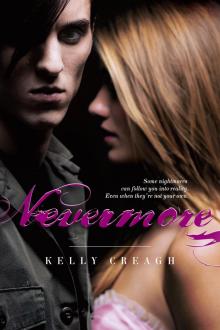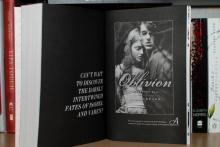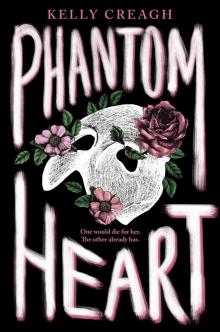- Home
- Kelly Creagh
Oblivion
Oblivion Read online
src="https://picture.efrem.net/img/170610/oblivion.jpg" alt="Oblivion" title="Oblivion">Page 1
Prologue
Providence, Rhode Island
The home of the widow Mrs. Sarah Helen Whitman
November 9, 1848
“I beg of you to hear me, Helen!”
His voice rang shrill through the house, funneling up the narrow stairwell and down the hall, muffled little by the barrier of her bedroom door.
Pen in hand, Helen stared at the blank sheet of paper that waited on her writing desk. In her other hand, she clutched her white, lace-trimmed handkerchief, and the saccharine aroma of the ether contained within the cloth enticed her to breathe from its folds again.
She resisted, her focus remaining on the parchment.
But the promise of an empty page did little to ease the poetess’s mind the way it might have on a quieter morning. Even the ether, with its power to lull her senses, could do nothing to slow the palpitations of her agitated heart. Not with her ears attuned to the beseeching roars of the man whose recent behavior both confused and terrified her.
“Helen, without you I am lost. Lost!” he shouted, the anguished plea like a cry from hell itself.
It was true that she was hiding from him, firm in her decision to wait him out as she would a storm. She told herself, again, that she could not see him like this, fearful less of what words might pass between them—even of what answer she might give him—than of what she would find if she dared to look too closely into those eyes.
“A single word! One! That is all I ask. ”
“That is enough, Mr. Poe. ”
At the sound of her mother’s sharpened tone, Helen glanced toward the door, the tight ringlets of her dark-brown hair bouncing against her cheeks.
“You should be ashamed of yourself,” her mother went on. “There is simply no excuse for this beastly conduct. ”
Helen could tell her mother’s patience had fled. Her indignation had at last morphed into fury, and it would not be long now until one of them would bend to the breaking point.
Goodness knew what would happen then. . . .
Clearly something had to give. Someone.
Despite her trepidation, Helen knew that if any semblance of peace was to be restored to her home—to her spirit—that someone would have to be her.
“Helen! I pray that you are listening,” he railed, continuing to ignore her mother’s upbraiding. “Hear me in this—in what is certain to be my final plea. My life, my very soul depends upon you!”
Helen dropped her pen to the desk, rising. She pressed her handkerchief to her lips, closed her eyes, and inhaled. Then she made her way to the door and, opening it, frowned at finding her sister, Anna, standing just outside with her back pressed to the wall.
“You’re not going down there,” Anna said, her expression stern. “Ignore him as you have been. Let him crow on like his damnable raven until he has no voice left with which to squawk. ”
Helen’s name rose once again from the first-floor foyer, this time in a ragged scream.
Anna sneered. “Lord in heaven, have you ever heard anything so awful in your life?”
“Has he made any mention of what might have prompted this . . . visit?” Helen asked in a murmur, not wanting him to hear her, to know his howling had succeeded in drawing her from her seclusion.
“I think impropriety is the word you are searching for,” Anna replied in a hiss. “And yes. He did attempt to explain to Mother that after sitting for a daguerreotype this morning, he saw a white face in the studio’s light-reflecting mirror. It stared straight at him, he said, with eyes black as night. ”
“Those were his words exactly?”
“He is mad, Helen. Do not go to him. ”
Helen made no reply but took her first steps toward the stairwell, skirts rustling.
“Do you care this little for me?” she heard him wail. “Do you doubt me? Or suspect I have not told you the truth entirely?”
“It is no use shouting these delirious inquiries, Mr. Poe,” her mother said. “It should be beyond clear to you that my daughter has no wish to entertain your call. ”
“I am doomed, Helen! Doomed! In time and eternity. All I ask is for one word. Say yes, Helen. Say yes and save this poor wretch. Say what you have not yet said. That you do love me!”
“Edgar. ” Helen spoke his name as she stepped onto the topmost stair. At the sound of her voice, his head jerked up.
Dressed in his shirtsleeves, his dark hair wild, his eyes crazed, he looked, to Helen, the very portrait of insanity.
She drew in a sharp breath. Clutching tightly to the banister, she steeled herself and began to descend, closing the distance between them one tremulous step at a time. Page 2
“Helen. ” He held a quivering hand out to her. “You have heard me. And now at last you’ve come. An angel sent to save me from perdition. ”
“Edgar, what is the meaning—?”
“My fate rests with you. ” He fell to his knees and clutched the skirts of her dress, peering up at her. For a moment, Helen lost her ability to speak, wondering if what she saw could be attributed to the heightening effects of the ether.
Gone were the ghost-gray eyes of the man who’d proposed to her in the cemetery less than two months before, and she now wondered if the spectral gaze he’d claimed to have seen in the mirror that morning could have belonged to his own reflection.
For the eyes that stared up at her now, imploring and full of dread, were indeed as black as night.
Blacker.
1
A Valentine
Dear Varen,
After putting your name on paper, it seems I can hardly hold my pen steady. So this won’t be neat. I’m not good with words like you are, so it won’t be eloquent, either.
Valentine’s Day is this weekend. I’m in English class, and Mr. Swanson wants us to work on composing romantic sonnets. He’s gone over the format twice, but thinking about iambic pentameter and quatrains makes me feel like I’m trying to solve a math word problem. At least, I’m pretty sure my poetry reads like one.
If you were here, I know you’d already be done with yours.
I also know it would be beautiful.
I can see your desk from where I’m sitting. I won’t find you there even if I look, but part of me is always afraid that I will.
Sometimes I wonder if that’s what you wanted. For me to be afraid of you. For everyone to be afraid, so no one would try to get close.
They tell me that I died. They say that I was dead, and I want to tell them I still am. At least that’s how I feel. Because I know where you are and what’s become of you. Because I couldn’t stop it and I couldn’t bring you back. Because Reynolds was right when he told me I couldn’t reach you.
Everything’s broken.
And yet here I am, writing you what must be a Valentine.
Because even though I know I shouldn’t still love you, even though I know that is the last thing I should have room to feel for you, more than anything, I want to tell you I do.
* * *
Isobel lifted her shaking pen from the vein-blue lines of her notebook, wondering how the confession had managed to escape her.
She’d never written like that before, where the words just poured out, unstoppable.
The final line burned into her retinas, echoing a truth that she’d hoped to keep hidden away, locked inside with everything else.
She smacked a hand on the paper, crumpling it.
What was wrong with her? Why couldn’t she let go?
Why, when he had let her go?
The lunch bell rang, the noise shredding her already frayed nerves.
“Okay, fol
ks,” Mr. Swanson said, standing from behind his desk, his wooden rolling chair sliding back to bump against the chalk tray. “I’d like to go ahead and collect these today, even if you’re not finished. I’ll hand them back tomorrow, so you’ll have the first few minutes of class to do some revising, and then I’ll grade them over the weekend. ”
Everyone got up, papers flapping, and the unanimous flutter in the room reminded Isobel of a flock of birds taking wing.
Tekeli-li . . .
Afraid someone might catch sight of Varen’s name, Isobel ripped her own rumpled paper free and stuffed it into the middle of the notebook.
Glancing up, she saw that Mr. Swanson had moved to the door. Like a ticket taker, he collected papers as her classmates filed into the hall.
“Another reason I should gather these now,” he said, “is the simple fact that many a great work of literature has been lost by remaining tucked haphazardly into the pockets and knapsacks of young, carefree scribes such as yourselves. Wanderlust wayfarers, cavalier bards, wistful wordsmiths—”
“And phat rappers,” Bobby Bailey said as he handed Mr. Swanson his sonnet.
“And portly rappers, why not?” Mr. Swanson conceded with a nod, adding Bobby’s paper to the accumulating stack.
Isobel rose. She tore off the top sheet of her notebook and, gathering her things, kept her head down as she approached the door and its guardian. Handing in the blank paper, she ducked past him into the hall.
“Ah, Miss Lanley,” he called after her, his voice carrying over the rising chatter and banging of lockers.
Flinching, Isobel stopped.
“I see thou hast submitted parchment free of words, and thus error. How very avant-garde,” Mr. Swanson said, talking in that way he sometimes did, like a Shakespeare character who had somehow clawed his way out from the press of musty book pages.
Page 3
The power of words . . .
“Fear not, fair leader of cheers,” he went on, “I both recognize and appreciate the temperament of the artist who feels her work is, as yet, unfit for the scrutiny of another’s eye. So how about I grant thou till the morrow to turn in yon magnum opus I saw thou scribbling on mere moments ago?”
She clutched her books tighter.
“No offense, Mr. Swanson,” Isobel heard Katlyn Binkly interject, “but I think you read too much. ”
Grateful for the momentary distraction, Isobel slid alongside Bobby and his basketball friends. Hiding herself between their lumbering forms and the wall, she used them for cover while they headed for the cafeteria.
“Alas,” she heard Mr. Swanson sigh as she moved down the hall, “’tis entirely possible. But would you have me forfeit my adoration of the written word for such folly as reality TV?”
Isobel steered herself away from Bobby’s group and past a senior couple kissing behind an open locker door meant to hide their PDA from Mr. Nott, the hall-slash-lunchroom monitor. The girl had her arms thrown around the boy’s neck. In one hand, she clutched a small bouquet, bundled together with baby’s breath and wrapped in clear plastic.
Isobel halted when she caught sight of crimson buds through the glossy film.
Three red roses.
Taking notice of Isobel, the girl broke the kiss. Following his girlfriend’s gaze, the boy turned his head to see what had interrupted their embrace.
“What are you staring at?” he asked.
An infamous question, Isobel thought. One she’d been asked before.
“Taking notes?” the girl chimed in.
Notes.
Isobel moved on without responding.
“Freaking head case,” she heard the boy mutter.
The whispers didn’t bother her anymore, though. Not like they used to.
Bypassing the entrance to the lunchroom, she made her way to the side door that led to the courtyard. She wanted to avoid the displays of cardboard-cutout arrow-pierced hearts, dart-shooting cupids, and dangling red-and-white streamers. That meant steering clear of the cafeteria and the gym, both of which had been festooned in decorations.
Isobel shoved open the door, and February greeted her with icy breath.
As she walked to one of the courtyard’s empty stone benches, gathering the escaping wisps of her hair and tucking them behind one ear, her fingertips brushed the cheek that bore a slanted, needle-thin scar.
Though the wound had healed, and though she took care to mask it every morning with concealer and powder, Isobel still felt the scar’s presence. It carried with it a constant, low-grade pain she could never be certain was real or imagined: a by-product of lingering nerve damage, or a sensation produced from the lasting memory of how she’d received the gash.
We are ever and always home now.
Pinfeathers’s final words bubbled up through the mire of haunting echoes in her mind. In spite of herself, she checked the oak tree limbs and scanned the school’s roof ledge, searching for any sign of ebony feathers, or the black stare that longed for . . . what? She doubted even he knew.
Had known.
Isobel set her things down on the bench, unsure of what to do with herself. Wanting to avoid Gwen, she hadn’t stopped by their adjacent lockers to pick up her parka or the sack lunch she’d made that morning.
Since today was Trenton’s annual Valentine’s Day luncheon, she had told Gwen the previous afternoon that she wanted to spend the lunch break on her own. She’d done so as a favor to both of them. So Gwen could be with Mikey without feeling guilty about leaving her alone, and so that Isobel wouldn’t have to endure Gwen’s sympathetic glances and well-meaning attempts at condolence.
Even though Gwen still knew nothing about what had happened after Isobel disappeared through the open tomb door and into the dreamworld, there was one thing her friend could deduce through observation alone.
Isobel had failed to return with Varen.
As far as Gwen knew—as far as anyone knew—Isobel remembered nothing. And whether or not Gwen bought the amnesia act, Isobel didn’t think her friend had any real inkling as to what had actually occurred. She must have assumed that Varen had been determined to stay. Or worse, that Isobel had found him dead.
In a way, it felt like she had.
Whatever conclusion Gwen had drawn this time, though, she wasn’t asking questions or pushing for answers.
Maybe she had learned her lesson in that regard.
Maybe now that Gwen had her own losses to take into account—a fractured arm and a shattered sense of reality, perhaps even her own nightmares to contend with—she would simply give Isobel the slow fade. Like Isobel’s crew—Stevie, Nikki, and Alyssa—Gwen would find a way to bow out and extract herself from Isobel’s life. Or, like Brad, she might even convince her family to move to another state.
Page 4
“Special delivery,” came a voice from behind her, its clipped and all-too-familiar Brooklyn accent instantly negating all of Isobel’s theories.
Turning, she found Gwen standing a few yards away, her left arm free of its cast but still supported by a navy-blue sling. In her other hand, she held up a small paper basket of food.
“Mummified cucumbers and petrified potatoes,” Gwen said. “I hear pickles and Tater Tots are good for what ails you. Of course, I hope you don’t mind that I took the liberty of implementing the friend tax by eating the crispy Tots off the top. ”
“Where’s Mikey?” Isobel asked.
With a small, chagrined smirk, Gwen jerked her head over her good shoulder toward the cafeteria, where Mikey stood behind one of the wide windows, the side of his face and both palms smashed against the glass. Dressed in a black-and-white checkered hoodie and a pair of sunglasses that sat slanted across his mashed nose, he reminded Isobel of a giant swatted fly.
“Wow,” Isobel said.
“He makes up in skill what he lacks in couth, if you catch my drift,” said Gwen with a wink.
“Won’t Mr. Nott catch him doing that?”
Gwen shrugged, then set the paper basket down on the bench next to Isobel’s things. “I think he’s trying to cheer you up. You gotta cut him a break, though. He doesn’t know anything about, y’know . . . anything. ”
Isobel knew Gwen meant Baltimore. And Varen. And her.
Even though Isobel didn’t quite get Mikey’s allure, she was glad he and Gwen had started dating. Or pseudo-dating or . . . whatever was up with them. Mikey’s added presence to Isobel and Gwen’s locker run-ins and lunch breaks gave Isobel an excuse not to talk about things that fell into the “anything” category Gwen had mentioned. And a reason for Gwen to continue keeping her questions to herself. Aside from that, though, and perhaps most important of all, Isobel could tell Gwen was falling for the guy.
The tipping point, she knew, had been the morning Mikey had flown up to Baltimore to get Gwen—January nineteenth, the same morning an anonymous stranger had dropped Isobel off, soaking wet and half-dead, at the city’s university hospital.
The same morning she’d flat-lined.
Edgar Allan Poe’s birthday.
A week later Isobel had come home with her family. A week after that, she’d returned to school to learn through Gwen, during their initial and only private locker visit since Isobel’s literal reintegration into reality, that Mikey had used money from a pizza delivery job to buy his plane ticket. Since Gwen had suffered a fractured arm at the hands of Reynolds while trying to help Isobel in the cemetery, the task of making the eleven-hour return drive in her Cadillac had fallen to Mikey as well. According to Gwen, however, he’d made the trek in under eight. Having ridden with him the night of the Grim Facade, Isobel didn’t find that hard to believe. At all.
In addition to filling Isobel in on the details of her return, Gwen had also recounted how Reynolds had run from the police after Isobel had shut him out of the dreamworld. The responding officers, Gwen had said, had seemed determined to detain anyone involved in the scuffle, even if that someone happened to be the Poe Toaster himself.
No one had caught him, though. He’d vanished, like he did every year, and Gwen had used the distraction of his flight to take refuge behind the headstone he’d flung her against. After that, she’d made her own escape by slipping into the crowd of onlookers.
Because of the overshadowing story that the Baltimore Ravens had lost the finals, missing out on their Super Bowl ticket, the only mention of the Poe Toaster ordeal in the press had been how a few spectators had scaled the cemetery walls. Again.

 Nevermore
Nevermore Enshadowed
Enshadowed Oblivion
Oblivion Phantom Heart
Phantom Heart